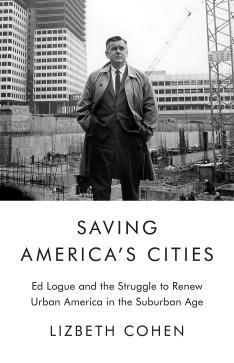The author: Lizabeth Cohen ’73 is the Howard Mumford Jones Professor of American Studies at Harvard University and the former dean of the Radcliffe Institute for Advanced Study. She is the author of Making a New Deal: Industrial Workers in Chicago, 1919–1939, a finalist for the Pulitzer Prize and winner of the Bancroft Prize, and A Consumers' Republic: The Politics of Mass Consumption in Postwar America.
Opening lines: In September 1953, thirty-two-year-old Ed Logue returned to New Haven, Connecticut, with his wife, Margaret, to await the birth of their first child after six years away. They were resettling into a city that had launched Logue into adulthood. Here he had widened his horizons as a scholarship student at Yale College, had worked his first full-time job as a labor organizer, and had trained for a profession at Yale Law School. Here, too, he had met and married Margaret, the daughter of an influential couple in New Haven academic circles, the much-admired dean of Yale College William Clyde DeVane and his wife, Mabel Phillips DeVane. Casting about for his next career move after working in India for eighteen months as Ambassador Chester Bowles’s special assistant, Logue was considering hanging out his shingle as a New Haven lawyer.But then opportunity intervened. Logue had arrived just in time to help with the mayoral campaign of the Democratic reform candidate Richard Lee, who was mounting his third attempt to be elected mayor of New Haven. The determined, thirty-seven-year-old hometown boy, “Dick” Lee, currently the director of the Yale News Bureau, built his run around an ambitious promise to “renew” what was undeniably a deteriorating New Haven. Factories were closing, downtown retail was stagnating, and middle-class residents were decamping for the city’s flourishing suburbs. These departures, furthermore, were fueling growing discontent among those remaining behind, who resented how the city’s property tax rates kept climbing simply to sustain existing services. Logue, identifying himself as a “longtime admirer of Dick Lee,” became a key player in Independents for Lee, an effort to position Lee as an alternative to business as usual as practiced by New Haven’s Democratic Party machine. The third time was the charm, and Lee claimed victory on the night of November 3, 1953, with 52.3 percent of the vote.
Within weeks of his election, Lee invited Logue to be his executive secretary, an ostensibly part-time post that Lee created to tap the unique combination of smarts, energy, and vision that he saw in Logue. Logue accepted, but it quickly became apparent that the job was much bigger, more like an unofficial deputy mayor. They lost little time collaborating on an ambitious plan to remake New Haven as “a slumless city—the first in the nation,” as they liked to say. In February 1955, Lee officially appointed Logue as the development administrator of the New Haven Redevelopment Agency. Logue’s brilliance at garnering newly available federal urban renewal funds, combined with Lee’s intimate knowledge of New Haven, made them an irrepressible and nationally admired team who could boast that they were attracting more federal dollars per capita to New Haven than any other American city was getting. The masterful politician and his bureaucratically savvy partner together piloted schemes in New Haven that other cities would watch and copy.
Medium-size New Haven, a struggling old industrial city in an increasingly suburban postindustrial age, became the model city of urban renewal, a laboratory for salvaging urban America. The problems that Dick Lee and Ed Logue were addressing were faced by many American cities that had flourished with the rise of America’s industrial might in the nineteenth century. Now, in the second half of the twentieth, these cities were atrophying as their manufacturing bases disappeared. Strategies to renew American cities would evolve continually for at least two more decades, in response to new ideas, mistakes made and learned from, the ebb and flow of funding, and political pressures exerted from many quarters, most notably policy makers in Washington and critics at the grass roots. The successes and failures of Dick Lee and Ed Logue’s efforts in New Haven reveal how the urban renewal project fared in its first phase during the 1950s.
Reviews: “Is it possible to write not only a good book about urban renewal but also a beautiful one? If you are Lizabeth Cohen, it is. Saving America’s Cities is, at once, a new, wise and more balanced take on past efforts to save America's cities and a fascinating portrait of Ed Logue, a central figure in urban policy whose personal trajectory parallels the course of our debates over what works and what doesn’t. If you care about cities, you should read this book. But you should also read it if you simply love a great story full of compelling characters engaged in high-stakes struggles. It’s a wonderful achievement.”—E. J. Dionne, Jr., author of Our Divided Political Heart, Why the Right Went Wrong and co-author of One Nation After Trump


